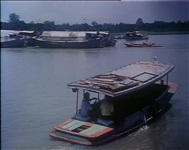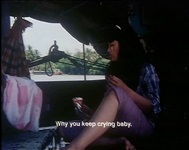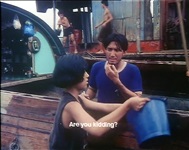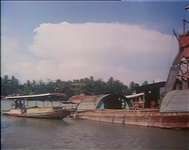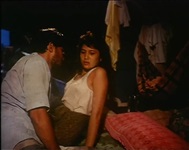The Sister-In-Law (1991)
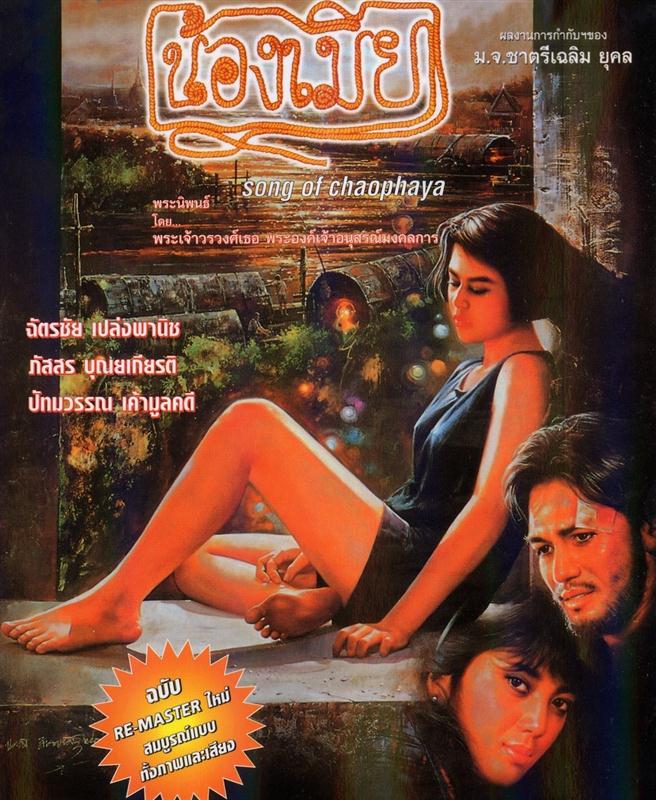
Living on a boat can be fun... for a week or two. I used to regularly take boating holidays with my family as a child, and it was nice to just boat around different places and be gently rocked to sleep by the water. After a week or two I was happy to head back home though. For many people, a boat is home not just for a few weeks but for a lifetime. For some, this may be perfect, but others undoubtedly wish they could see more of the world and/or have a more permanent place to call home. PRANG is one such person, depressed and disatisfied with a life on a barge, barely making ends meet transporting sand along the river. When she is "spotted" and told she could become a star, she sees the world open up before her and gladly decides to leave her husband, sister and baby behind in the pursuit of a more glamorous life.
SANG is the husband left behind, much to his distress. He resolves to search all of Bangkok if necessary to find his wife and bring her back. Off he goes, leaving his sister-in-law TUBTIM behind to look after the baby.
The best thing about the films of Tan Mui (Prince Chatrichalerm Yukol) is that this viewer at least can always relate to the characters. It seems funny that many film-makers make movies about kings, princes, superheroes and other lifestyles with which they have no direct experience... then when a bona fide prince makes movies, he specialises in stories about ordinary people (Suriyothai being the exception that proves the rule). He does a very good job of it though, so perhaps the life of a prince isn't that far removed from that of the common folk as one might imagine.
The first Tan Mui film I saw was mU pUn, aka Gunman. Thanks to the misinformation on IMDB I thought I'd just seen the film THE SISTER-IN-LAW. This misconception was encouraged by the fact that a sister-in-law plays a minor but pivotal role in the story. The real THE SISTER-IN-LAW doesn't feature any gunmen, but the role of the sister-in-law is again relatively minor - less pivotal even, so it's not clear why she gets to name the movie.
Tan Mui seems to specialise in stories of the common folk, the members of society that are often forgotten - his works are very socially relevant-to-critical. NORNG MIA seems less so than other films, and could perhaps be accused of promoting the idea that "common folk should know their place and not try to rise above it". I don't think that was really his intention though, and the viewer is certainly meant to sympathise with characters rather than condemn them. It's hard to ignore the fact they're very naive though, which makes it a little difficult to be sympathetic.
2001's Monrak Transistor can in some ways be seen as a role-reversed retelling of a similar story to NORNG MIA, though seen through fresh, creative and stylish spectacles (and with musical numbers).
NORNG MIA is a fairly solid drama, with well defined characters and competent direction. It's less ambitious than a GUNMAN, Sia Dai or ELEPHANT KEEPER though, and the story doesn't carry as much impact as those films. It's a fairly well made film (the technical difficulties of filming so many scenes on water being one notable accomplishment, I guess), but not one that's likely to stay with me in the same way some of Tan Mui's other films have done
Crew
| Director | |
|---|---|
| Writer | |
| Editor |
Also known as
- Song Of Chao Phraya
- Song for Chao Phraya
- Nawng Mia
